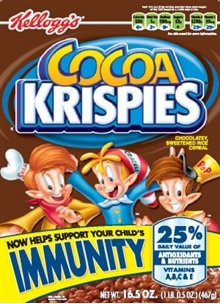Marketing to Fear: Cocoa Krispies Boost Your Kids' Immunity?
 In the middle of the H1N1 influenza epidemic, Kellogg is marketing Cocoa Krispies, Froot Loops and other sugary cereals with claims on the box that the cereal "now helps support your child's immunity." The word "immunity" is printed on the box in a huge font, almost as big as the name of the cereal. San Francisco City Attorney Dennis Herrera wrote a letter to Kellogg's CEO demanding evidence that the cereals really do help support children's immunity. Herrera points out that the company is playing to public fears about the H1N1 flu epidemic, saying "The immunity claims may also mislead parents into believing that service this sugary cereal will actually boost their child's immunity ..." Kellogg argues that critics of its immunity campaign are wrong, pointing out that the cereals contain increased amounts of vitamins A, C and E, which play a role in the immune system, and saying that "Kellogg developed this product in response to consumers expressing a need for more positive nutrition." Marion Nestle, a nutrition professor at New York University, author of Food Politics and other books about the food industry and nutrition, says, "The idea that eating Cocoa Krispies will keep a kid from getting swine flu, or from catching a cold, doesn't make sense. Yes, these nutrients are involved in immunity, but I can't think of a nutrient that isn't involved in the immune system." Professor Nestle wrote to the U.S. Food and Drug Administration protesting Kellogg's claims in August, but hasn't heard back, and FDA official are not permitted to discuss specific cases under consideration.
In the middle of the H1N1 influenza epidemic, Kellogg is marketing Cocoa Krispies, Froot Loops and other sugary cereals with claims on the box that the cereal "now helps support your child's immunity." The word "immunity" is printed on the box in a huge font, almost as big as the name of the cereal. San Francisco City Attorney Dennis Herrera wrote a letter to Kellogg's CEO demanding evidence that the cereals really do help support children's immunity. Herrera points out that the company is playing to public fears about the H1N1 flu epidemic, saying "The immunity claims may also mislead parents into believing that service this sugary cereal will actually boost their child's immunity ..." Kellogg argues that critics of its immunity campaign are wrong, pointing out that the cereals contain increased amounts of vitamins A, C and E, which play a role in the immune system, and saying that "Kellogg developed this product in response to consumers expressing a need for more positive nutrition." Marion Nestle, a nutrition professor at New York University, author of Food Politics and other books about the food industry and nutrition, says, "The idea that eating Cocoa Krispies will keep a kid from getting swine flu, or from catching a cold, doesn't make sense. Yes, these nutrients are involved in immunity, but I can't think of a nutrient that isn't involved in the immune system." Professor Nestle wrote to the U.S. Food and Drug Administration protesting Kellogg's claims in August, but hasn't heard back, and FDA official are not permitted to discuss specific cases under consideration.
- 5690 reads
 Printer-friendly version
Printer-friendly version- Add new comment
- permalink





Comments
Loaded w Sugar
Most of the breakfast cereals marketed to kids are loaded with sugar and refined carbohydrates. It's amusing that the would market them as having immune boosting properties--especially considering our current problems with childhood obesity.